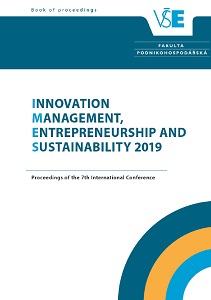Innovation, Competition & Contingent Work
Innovation, Competition & Contingent Work
Author(s): Matthijs den Besten, Issam Laguir
Subject(s): Social Sciences, Economy
Published by: Vysoká škola ekonomická v Praze
Keywords: SMEs; France; temporary work; innovation perception; imprinting
Summary/Abstract: Purpose: The benefits of a flexible workforce are widely recognized. Yet, studies of particularworkforce arrangements such as reliance on freelancers show that these arrangements are notadopted in equal measure by all firms. This study looks at the use of non-permanent contractsmore in general. Its aim is to corroborate the supposition that the need for innovativeness andcompetitiveness is what creates a demand for flexibility among firms.
Design/methodology/approach: For our analysis, we rely on self-reports with respect toinnovation, competition and the use of alternative labour contracts from a cohort of firms overa period of five years. On the basis of logistic regressions, we assess the impact of a firm’soutlook at the beginning of the period on its propensity to engage flexible labour later on. Oursample comprises some 50,000 small and medium-sized enterprises that were created in Francein 2002.
Findings: The results of our analysis confirm the idea that firms facing challengingenvironments are more likely to look for alternative workforce arrangements. In addition to thefirm’s initial assessment of its situation, we found that firms that rely on alternative labourcontracts in the creation phase are more likely to employ such contracts later too.
Research/practical implications: Our findings reinforce the association of workforceflexibility with innovation orientation. Considering the impact of early experience andassuming the benefits of flexibility, the findings suggests that instruments should be developedto expose firms in innovative and dynamic environments to alternative work forms right aftercreation.
Originality/value: This paper establishes innovation and competition outlook as antecedentsto the employment of contingent work. Thus, it provides a crucial contribution towardsaddressing the wider question how contingent work helps transform initial ambitions into actualoutcomes with respect to innovation and competitiveness.
- Page Range: 128-136
- Page Count: 9
- Publication Year: 2019
- Language: English
- Content File-PDF

